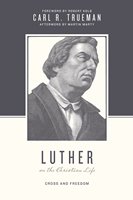Welcome to Books At a Glance. I’m Fred Zaspel and we’re talking again to Dr. Carl Trueman who is tracking out some of the steps of the Protestant Reformation of the sixteenth century. Today he is talking to us about Martin Luther’s marriage.
Carl, tell us about Luther’s wife and how their marriage came about. And why was it somewhat a scandalous thing?
Trueman:
Well, Luther marries, in 1525, a young lady called Katharina von Bora. She was actually a nun; she had been given to a nunnery as a very young child, when she was five or something like that, when she becomes a nun or goes to a nunnery. She escapes from the nunnery in 1523. As the Reformation is spreading through Germany, monasteries and nunneries are closing down; and she escapes from the nunnery with a group of fellow nuns actually hidden in herring barrels that arrive in Wittenberg. Within a couple of years all of the nuns who have come have been married off to suitable people except for Katharine. Luther and the elite in Wittenberg made a number of attempts to marry her off. She falls in love with a young man whose parents don’t approve of the match. The Wittenberg authorities try to marry her off to some miserable old skinflint Lutheran pastor (both men laughing). She didn’t want to get married to him. So finally, Luther agrees to marry her himself. They get married in 1525 – it’s not a marriage born out of love, but it’s certainly one that grows into love.
Why was it scandalous? Well, for a couple of reasons. On one level, it was becoming less scandalous for nuns and monks to marry by that point; it was spreading through Europe as a practice, ex-monks and ex-nuns marrying, but it was still pretty huge for the great leader of the Reformation to marry a nun, and it played into Catholic propaganda about – you know, it was all about sex, and it’s all about priests and monks wanting to have their evil way with women. So, it played into that propaganda stream. It was also hugely controversial because it took place at the height of the Peasants’ War. There was a lot of bloodshed in Germany at that particular point in time and it was regarded as somewhat insensitive for Luther to be engaging in his nuptials at this point.
So, those of the reasons there was controversial. And, also, it’s interesting, it was often the case that in the weddings of nobles, the consummation was witnessed. The consummation of Luther’s marriage was witnessed in order, really, to make sure, the witness could say, that nothing weird happened as Luther and his wife, you know, did what people do on their wedding nights. I always thought, telling that story to students because it makes them cringe, but of course it makes perfect sense because Luther needed to guard himself against Catholic propaganda at that point.
One of the questions I throw out in class sometimes – what would’ve happened if Luther’s first child had been stillborn? It could have put the brakes on the Reformation, because that would have been seen as a sign of God’s judgment. Things that we regard as natural now, were regarded as supernatural back then. And so, Luther’s marriage, you know, it was important that it went smoothly, if I can put it that way.
Zaspel:
You mentioned that it was a marriage that grew in love. What do we know about their marriage and their relationship together?
Trueman:
Well, Luther spoke very, very affectionately about her. He would refer to her as – maybe this doesn’t sound affectionate – but he would refer to her as my chain. Because Katharine in Latin is very like the Latin word for chain. It appears that she did rule the roost. They were given the Augustinian cloister in Wittenberg as a wedding present by the Elector and she appears to have ruled the roost. And he would write touching love letters to her. If you visit the Lutherhaus today in Wittenberg, the doorframe – there is a stone doorframe with two seats, one on either side – and that was a birthday gift from Katharine to Martin because she became convinced that they didn’t talk together enough. And so, at the end of each day, they would sit on either sides of the door and talk to each other. And, again, bad news for you Baptists, I’m afraid (both men laughing) she was an excellent home brewer (still laughing) and he really appreciated the beer that she brewed. So, in addition to not being converted, he also drank beer! Fred, I don’t know how you guys can appropriate that.
Zaspel:
(Still laughing) Well, he’s German. What do you expect?
Trueman:
That sounds like a racist comment, but we’ll let it pass. (More laughing)
Zaspel:
I’m German!
Was Luther’s wife involved in his ministry in any ways?
Trueman:
Yes, I think, very practically. First of all, she helped fund it. They did odd jobs around the town, the two of them; they did gardening and things like that. Because, you know, being a reformer and being a university lecturer didn’t bring you a lot of money. More importantly, they took in lodgers. The house was always full of student lodgers. My friend, Bob Cole, said to me, “The house must have been total chaos most of the time with kids and students coming in and out.” And she kept house for all of these people. And we also know from his Table Talk, these records of things he would say around the table in the evening, that she was quite capable of taking him down in public, if necessary. There’s an incident recorded where he makes an insulting comment about Caspar Schwenckfeld who was an Anabaptist leader. And she goes after Luther, she goes after her husband, and she says, you know, that’s an inappropriate way to speak about a minister of the gospel. And she lays into her husband and he backs down. So, I think Luther’s wife was like many of ours. I’m sure, Fred, that you never cross the lines, (Fred: Never!) So your wife never has to do this, but I’m grateful that I’ve got a wife who will call me out on occasion when she thinks I’ve crossed the line on something. That’s why I never tell my wife….
Zaspel:
(Both men laughing) I’m waiting to make a remark… I’m just biting my tongue here. There’s something to be said, but I think I’ll let it pass.
Zaspel:
How did the Reformation shape the idea of marriage and home life?
Trueman:
Well, in a couple of ways. I think one of the things the Reformation does, of course, in general, is it makes all legitimate callings holy. Because, ultimately, it’s doing things in faith and to the glory of God that makes a thing holy, as long as it’s legitimate. And I think what the Reformation did, was it made domestic work a glorious thing. You can see this, of course, in some of the paintings that one finds, for example, in the Dutch Golden Age in the 17th century where domestic scenes are painted in a way that gives them a sacredness, or a glory. That couldn’t have been done in the Middle Ages. So, in general, the Reformation makes ordinary life something sacred; and domestic life is part of that.
I think Katie Luther becomes a kind of archetypal role model for a Protestant wife. My friend, Robert Wilkin, who is a great Roman Catholic scholar – I have heard him lecture, and he has made the comment that one of the things about Protestantism is that women vanish from our public spirituality. You think of the medieval period, you get a lot of female Saints, Catherine of Siena, Hildegard of Bingen, and people like those. We don’t get so many in Reformation Protestantism, and he says it’s because Katie Luther becomes the archetype of female spirituality in Protestantism. I thought that may be an overstatement; I’m still wrestling with that in my own mind; but certainly it is the case that female spirituality in Protestantism becomes a much more domestic and private thing. I think the Luther marriage, if it isn’t the only paradigm of that, it’s certainly a significant paradigm of that in Protestant history.
Zaspel:
We’re talking to Dr. Carl Trueman about the Protestant Reformation. Join us next time as he talks to us about the Swiss Reformer, Ulrich Zwingli.
Grace Alone—Salvation as a Gift of God: What the Reformers Taught…and Why It Still Matters (The Five Solas Series)
wtsbooks
Paperback
Luther on the Christian Life: Cross and Freedom
wtsbooks
Paperback
Histories and Fallacies: Problems Faced in the Writing of History
wtsbooks
Paperback
The Creedal Imperative
wtsbooks
Paperback
Reformation: Yesterday, Today and Tomorrow
Amazon
Paperback
wtsbooks
Paperback
John Owen: Reformed Catholic, Renaissance Man (Great Theologians)
Amazon
Paperback
wtsbooks
Paperback
Minority Report: Unpopular Thoughts on Everything from Ancient Christianity to Zen Calvinism
wtsbooks
Paperback

